![Who’s Using What Social Media in 2024? [Report]](https://bersondeanstevens.com/wp-content/uploads/2024/07/BDSSocial_1200-1080x630.jpg)
by Lori Berson | Jul 30, 2024 | Marketing, Marketing Strategy, Social Media
The YouGove US Social Media Report 2024 provides a detailed analysis of the current social media environment, highlighting generational trends, gender differences, platform usage patterns, and brand preferences. Below is a concise overview of the key findings.
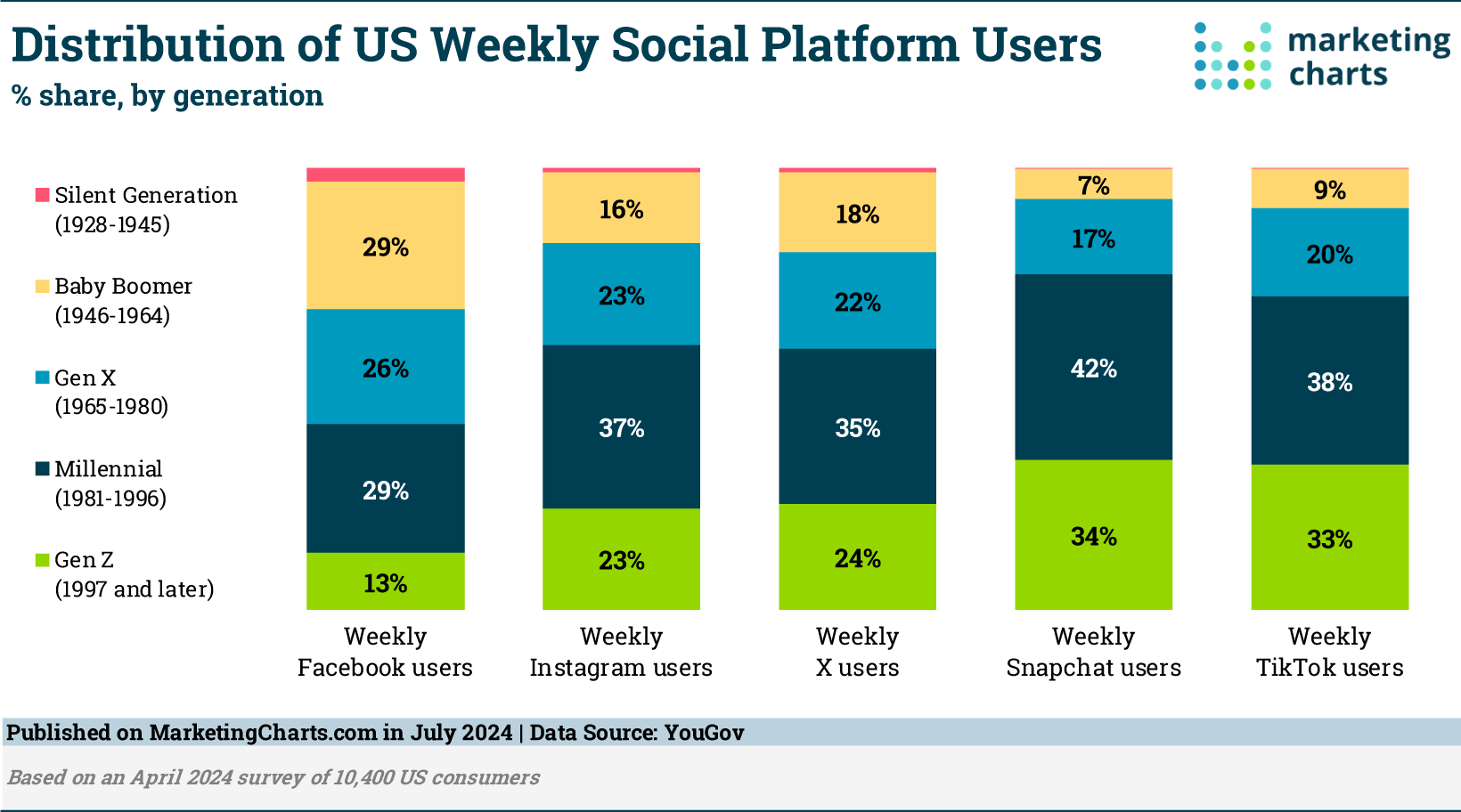
Generational Trends in Social Media Usage
- Younger Generations: Gen Z and Millennials dominate TikTok and Snapchat, attracted by engaging, dynamic content.
- Older Generations: Facebook remains popular among Gen X and Baby Boomers, primarily for staying in touch with friends and family.
Gender Differences in Social Media Use
- Female Users: Predominantly use TikTok, Snapchat, Instagram, and Facebook.
- Male Users: More active on X (formerly Twitter).
Platform Usage Patterns
- Facebook: Used mainly to keep in contact with friends (75%).
- X (Twitter): Popular for news updates (57%).
- TikTok: Primarily for entertainment (49%).
Gen Z’s Attitudes and Behaviors
- Increased Usage: 62% spend more time on social media than a year ago; 54% feel it positively impacts their lives.
- Concerns: 67% worry about the time spent on social media.
- Digital Preference: Prefer online interactions over in-person ones, more so than older generations.
Brand Preferences Among Social Media Users
- Popular Brands: Spotify and Nike are highly favored on Snapchat and TikTok.
- Platform-Specific Preferences: Each social media platform has distinct brand loyalties, essential for targeted marketing.
To effectively tailor social media strategies, businesses need to understand generational and gender differences, usage patterns, and brand preferences. This insight helps organizations make informed decisions on where to allocate marketing resources. Targeting the right platforms enables brands to reach and engage their desired audiences efficiently.
Key Takeaway
Knowing your audience and customizing strategies to their unique preferences and behaviors is essential for building strong, lasting connections on social media.
About the Data: The results concerning the demographic makeup of weekly social media users are based on an April survey of 10,400 US consumers.
BersonDeanStevens (BDS) has been developing results-driven marketing strategies, content, campaigns, and programs for over 25 years. And, we bring the knowledge and expertise to incorporate AI when necessary to gain efficiencies and help boost results.
Whether you’re looking for a fractional CMO, need assistance when your internal workforce is overloaded, or need consulting from time to time, BDS is the perfect go-to resource.
Ready to take your social media marketing to the next level? To get started, schedule a call or email Lori at lberson@BersonDeanStevens.com.
BersonDeanStevens has been a recognized brand strategy and marketing leader for over 25 years. We work in partnership with you to differentiate your brand and achieve your business goals. Client list.
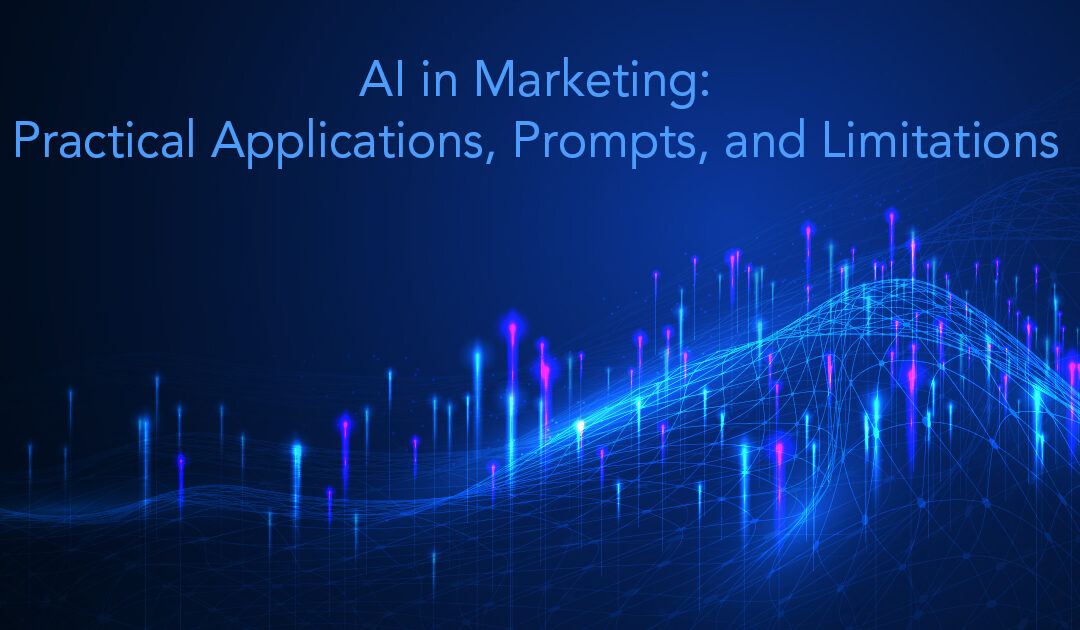
by Lori Berson | Jul 1, 2024 | AI, artificial intelligence, Marketing, Marketing Strategy
Artificial Intelligence (AI) is revolutionizing every aspect of marketing, offering a range of practical applications that can streamline processes, enhance personalization and customer engagement, and improve decision-making. However, it’s essential to understand both the benefits and limitations of AI to leverage its full potential effectively. Below are some of the practical applications of AI in marketing and the constraints to be aware of.
Practical Applications
- Data Cleaning
AI tools can automate the process of cleaning and organizing large datasets, ensuring accuracy and reliability for analysis.
Prompt: “Clean and standardize this dataset of customer contact information, removing duplicates and formatting inconsistencies.“
-
Accelerating Creativity and Ideation
AI can help brainstorm ideas for content, ad campaigns, and more, providing fresh perspectives and reducing creative blocks.
Prompt: “Provide five unique content ideas for a social media campaign promoting [product or service].”
-
Personalized Outreach
AI enables personalized email marketing campaigns by analyzing customer data to tailor messages.
Prompt: “Create a personalized email template for customers who have abandoned their shopping carts.”
-
Refreshing Content
AI can update and repurpose existing content to keep it relevant and engaging.
Prompt: “Revise this two-year-old blog post to include the latest 2024 industry trends and data.”
- Sentiment Analysis
AI tools can analyze customer feedback and social media posts to gauge public sentiment toward a brand or product.
Prompt: “Analyze the sentiment of these customer reviews and summarize the overall customer perception for our latest product release.”
-
Chatbots
AI-powered chatbots can handle customer inquiries, provide support, and enhance user experience on websites.
Prompt: “Set up a chatbot script to handle common customer service questions about shipping and return policies.”
-
Meeting Note Transcriptions
AI can transcribe and summarize meeting notes, making information easily accessible and actionable.
Prompt: “Transcribe and summarize the key points from this marketing team meeting recording.”
-
Video and Audio Editing
AI tools can edit video and audio files, adding effects, transitions, and enhancements quickly and efficiently.
Prompt: “Edit this video footage to create a 30-second promotional clip, including background music and captions.”
Prompting Tips
- Explain the task or problem as you would to a person. Treat AI as your assistant.
- Use examples to illustrate what you want.
- Give the model a “role” and tell it about your target audience.
- For detailed prompting tips, download our Prompting Frameworks.
Limitations of AI
- Factual Accuracy
- High-Level Strategy
- Reasoning and Logic
- Understanding Context
- Handling Uncommon Scenarios
- Humor
- Emotional Intelligence
- Consistency
- Representing Marginalized Groups
- Privacy
While AI is good for routine, repetitive, and data-driven tasks, it lacks the creativity, experience, and perception required to develop and implement viable, successful marketing experiences. Effectively using AI is all about balance; balance between the integration of AI and the experience and know-how of marketing professionals.
BersonDeanStevens (BDS) has been developing results-driven marketing strategies, content, campaigns, and programs for over 25 years. And, we bring the knowledge and expertise to incorporate AI when necessary to gain efficiencies and help boost results.
Whether you’re looking for a fractional CMO, need assistance when your internal workforce is overloaded, or need consulting from time to time, BDS is the perfect go-to resource.
Ready to take your marketing to the next level with AI? To get started, schedule a call or email Lori at lberson@BersonDeanStevens.com.
BersonDeanStevens has been a recognized brand strategy and marketing leader for over 25 years. We work in partnership with you to differentiate your brand and achieve your business goals. Client list.
![How Marketing Dollars Are Distributed [Report]](https://bersondeanstevens.com/wp-content/uploads/2024/06/MarketingDistrib_6.24-1080x630.jpg)
by Lori Berson | Jun 25, 2024 | Marketing, Marketing Strategy
In the latest analysis of marketing budgets, advertising has emerged as the largest expenditure for marketers worldwide. According to Salesforce’s State of Marketing report, B2B and B2C marketers allocate more of their budgets to advertising than any other resource. This trend underscores the critical role of paid media in reaching and engaging target audiences effectively.
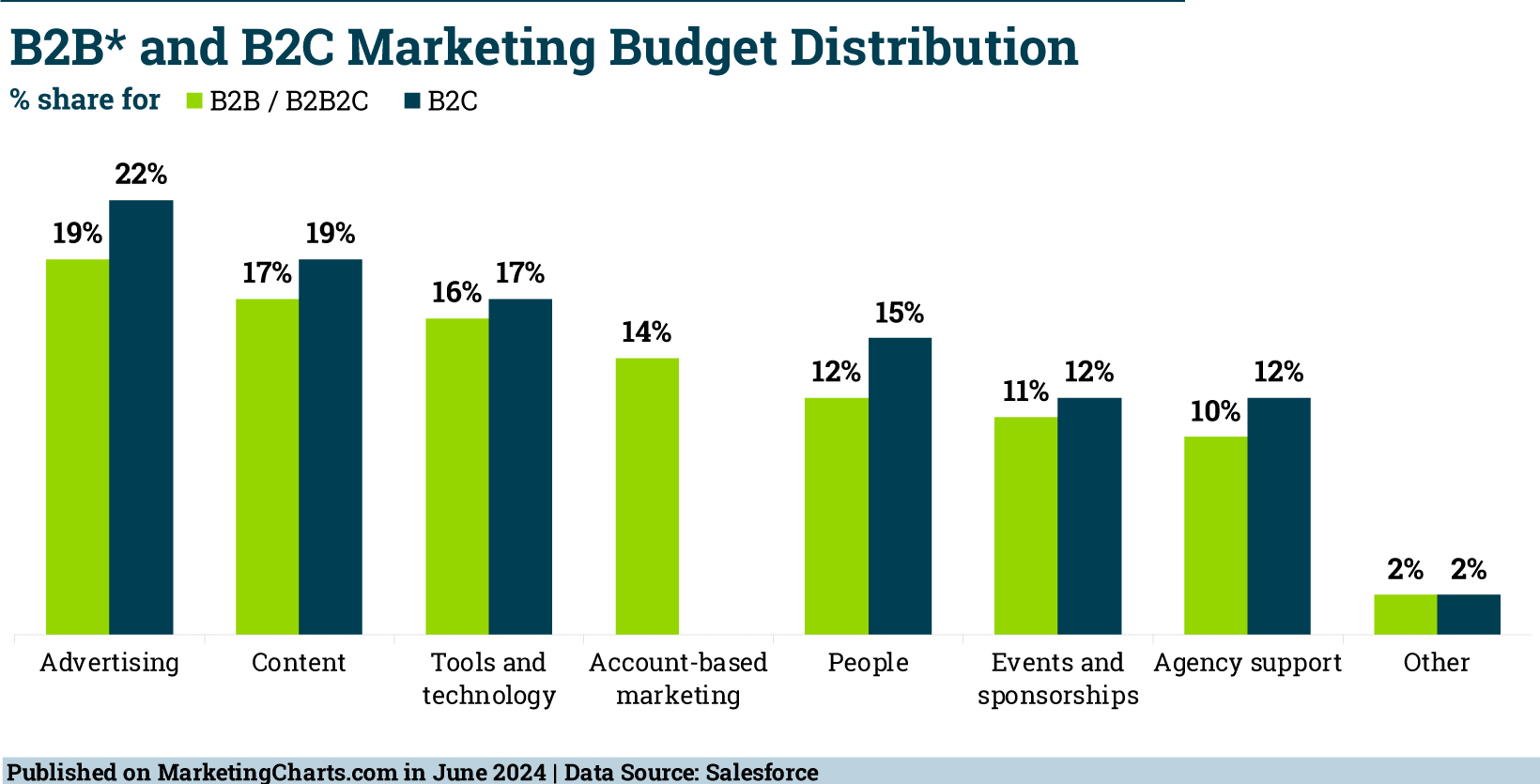
Key Findings
- Budget Allocation: B2B marketers allocate 19% of their budgets to advertising, while B2C marketers allocate an even higher 22%. This marks an increase from 2022, with ad spend rising by 3% for B2B and 4% for B2C marketers.
- Comparison with Other Expenses: In contrast, spending on agency support has decreased, now at 10% for B2B and 12% for B2C marketers. This suggests a shift in priorities towards direct advertising efforts.
- Content and Technology: Content remains a significant expenditure, accounting for 17% of B2B budgets and 19% of B2C budgets. Additionally, tools and technology claim 16% and 17% of the budgets for B2B and B2C marketers, respectively.
Gartner’s research aligns with these findings, noting an increase in paid media’s share at the expense of marketing technology, agencies, and labor since 2018.
Tools in Use
Marketers are utilizing an average of eight different tools and technologies, with marketing analytics/measurement tools (88%), customer relationship management systems (86%), and ad platforms (80%) being the most common.
Account Based Marketing (ABM)
B2B and B2B2C marketers allocate 14% of their budgets to account-based marketing (ABM). Interestingly, B2B marketers report a focus on customer acquisition (60%), product-led growth (48%), and upselling (48%), rather than solely on deepening relationships with existing customers.
Customer Focus
Among B2B respondents, 78% market to accounts, 65% to opportunities, and 64% to leads. However, the primary use of ABM is for new customer acquisition rather than maintaining existing relationships.
The trend towards increased ad spend indicates a shift in how marketers are prioritizing their budgets. As the digital landscape evolves, marketers are investing more in direct advertising methods, leveraging various tools to optimize their campaigns and reach their target audiences effectively. This focus on paid media underscores its growing importance in the marketing mix and the strategic adjustments marketers are making to stay competitive.
Data: The results are based on a global survey of 4,850 marketers across B2B (25%), B2C (50%), and B2B2C (25%) business models. Some 39% held the role of CMO (12%), VP or equivalent (27%).
Need assistance with your marketing strategy? To get started, schedule a call or email Lori at lberson@BersonDeanStevens.com.
BersonDeanStevens has been a recognized brand strategy and marketing leader for over 25 years. We work in partnership with you to differentiate your brand and achieve your business goals. Client list.
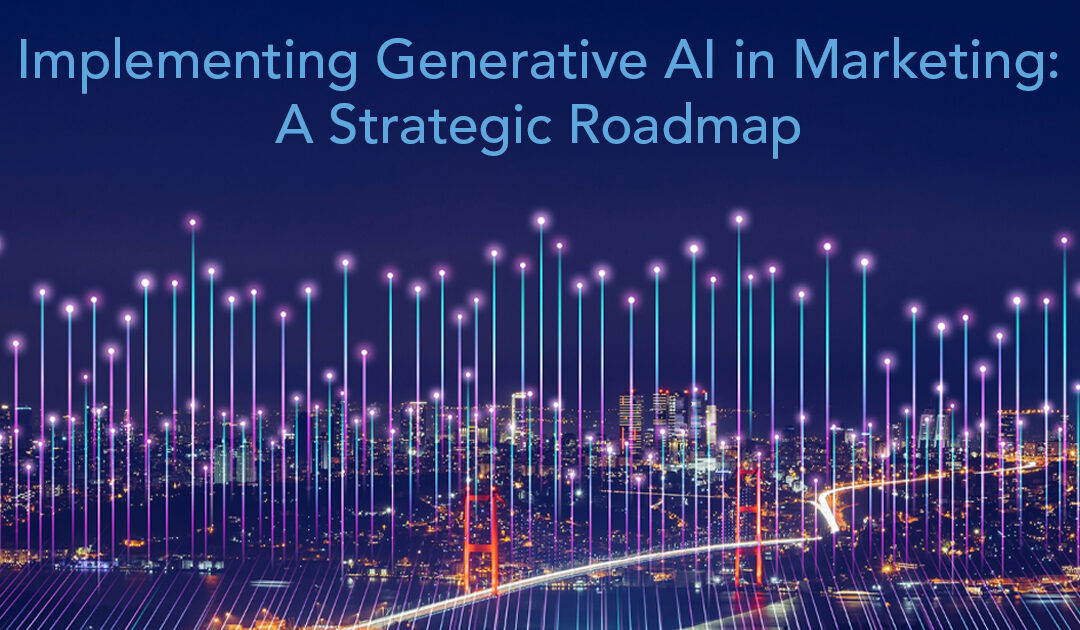
by Lori Berson | May 29, 2024 | AI, artificial intelligence, Marketing, Marketing Strategy
Generative AI (GenAI) is quickly transforming marketing, enabling content creation, decision automation, and data-driven insights. Adopting it promises competitive advantages, as major companies actively explore and implement GenAI solutions. However, realizing GenAI’s full potential requires a strategic, well-planned implementation approach. Here are several key considerations to keep in mind.
Assess Your Readiness
Before adopting GenAI, honestly evaluate if your organization is ready. This goes beyond just having the technology. Your use of GenAI must align with your overall business goals. Do you have enough staff and funding? Are roles and processes clearly defined? Many companies lack combined AI and marketing expertise, so you may need to bring in outside talent.
Build a Data-Driven Culture
GenAI relies on high-quality data for accurate outputs. Companies should develop strong data practices around governance, quality control, and privacy. Treating data as a strategic asset, rather than an afterthought, will pay off for GenAI and overall decision-making. A comprehensive data strategy is essential.
Tailor Use Cases
Don’t just adopt generic GenAI solutions. Identify your real marketing needs that GenAI can address. Get input and buy-in from employees across different teams. Use cases should be customized to your unique challenges and opportunities. Make sure to gather continuous feedback and maintain transparent ethical standards when building solutions.
Plan for Scalability
While pilot projects prove concepts, GenAI’s true value comes from wide-scale deployment across the organization. Market leaders get more productivity, quality, and creativity gains from scalable implementations. Design your use cases to smoothly integrate into all marketing operations. Robust change management prepares everyone for the transformation.
Manage Risks
GenAI introduces new risks around compliance and cybersecurity. You should adhere to AI governance frameworks like NIST’s AI RMF and the EU AI Act. And implement “security-by-design” via practices like penetration testing to address AI’s unique cybersecurity risks.
Assess Expertise
GenAI’s implementation requires skills that blend AI and data science with deep marketing know-how. Since this skill set remains scarce, companies should supplement staff with fractional or contract marketing experts who can provide specialized leadership and cross-functional guidance throughout the implementation journey.
With careful strategy and preparation, GenAI can drive innovation, operational efficiencies, and a sustained competitive advantage. Those who get it right will be well-positioned to thrive in this exciting new era of data-driven, AI-enabled marketing.
Ready to integrate AI into your marketing? To get started, download our tip sheets and schedule a call or email Lori at lberson@BersonDeanStevens.com.
BersonDeanStevens has been a recognized brand strategy and marketing leader for over 25 years. We work in partnership with you to differentiate your brand and achieve your business goals. Client list.
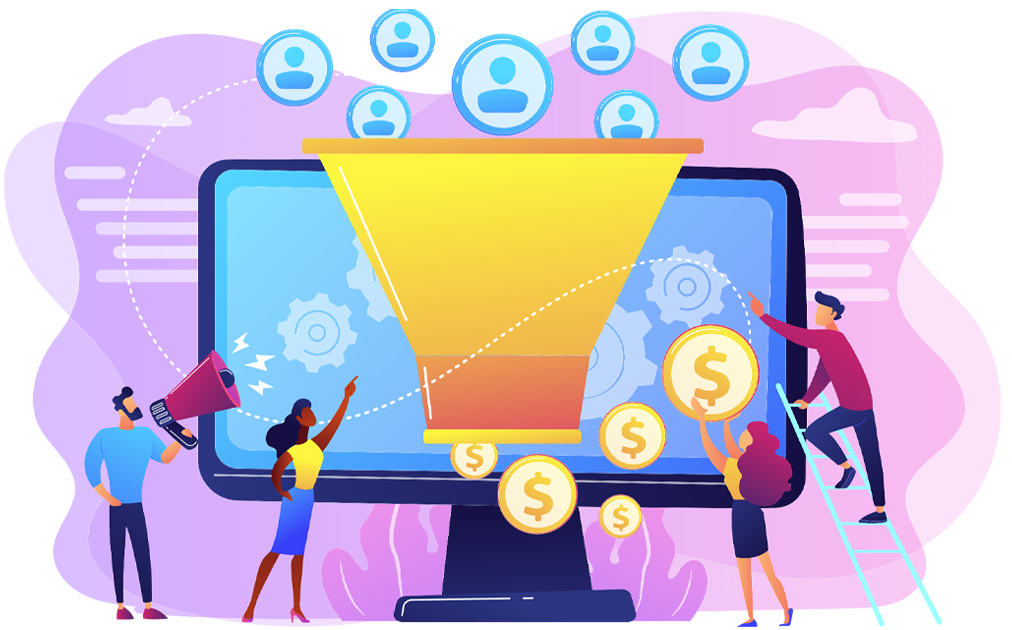
by Lori Berson | May 15, 2024 | Marketing, Marketing Strategy
In a recent study by Constant Contact and Ascend2, roughly 39% of small and medium-sized businesses (SMBs) across the US, UK, Australia, and Canada are increasing their marketing budgets this year. This uptick in spending is not just about spending more; it’s about strategically expanding marketing efforts to include a wider selection of channels and tactics. In fact, over 40% of SMBs are set to diversify their marketing channels and tactics, recognizing the need to adapt to a rapidly changing market environment.
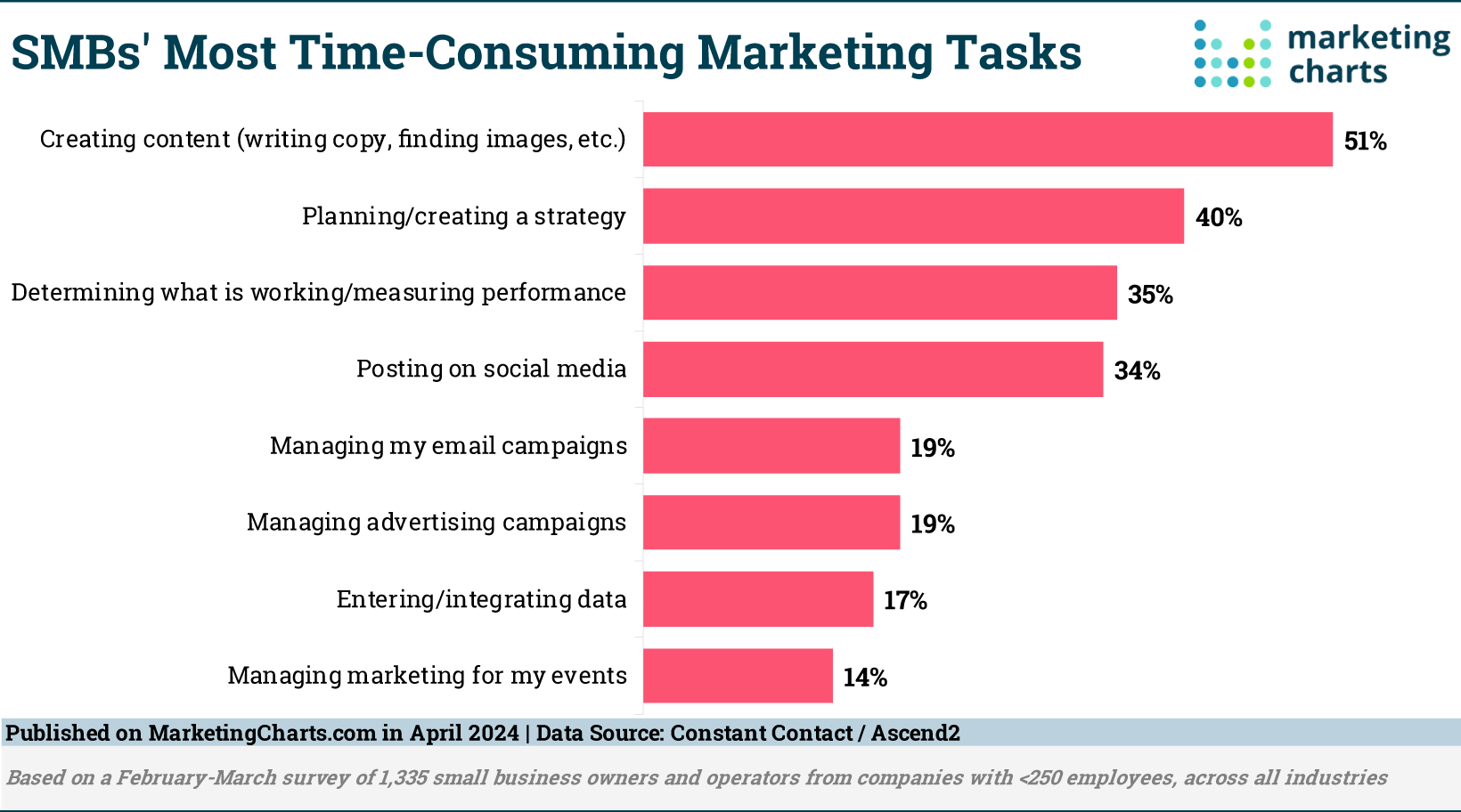
This expansion means businesses will need to dedicate more time to their marketing strategies. Currently, most SMBs spend less than an hour per day on marketing, focusing their energies instead on essential business operations such as customer interactions and order fulfillment. However, as marketing budgets increase, 44% of SMBs anticipate that more of their time will be allocated to marketing endeavors.
Despite the intention to ramp up marketing efforts, a significant challenge remains: many SMBs (52%) regularly delay or postpone marketing activities, often due to time constraints. Content creation, strategy planning, and social media posts are particularly susceptible to delays. These tasks are not only time-consuming but also require specific marketing knowledge that many SMBs lack. This knowledge gap often confines them to familiar and easy-to-implement channels, potentially limiting growth.
Advantages of Fractional Marketers
To overcome these challenges and effectively use their increased budgets, SMBs can benefit from hiring fractional marketers. Fractional marketers are experienced professionals who offer their expertise on a part-time or contract basis. Here are several key benefits of bringing fractional marketers on board:
- Expertise on Demand: Fractional marketers bring specialized knowledge and skills that may be missing internally. They can strategize, execute, and measure the effectiveness of various marketing tactics, filling the knowledge gap without the cost of a full-time hire.
- Cost Effectiveness: Hiring a fractional marketer is more affordable than employing a full-time senior marketing executive. SMBs can access top-tier talent while staying within budget, ensuring that increased marketing investments deliver maximum impact.
- Flexibility and Scalability: As SMBs expand their marketing efforts, they need flexible strategies that can scale with their growth. Fractional marketers can adjust their involvement based on the company’s current needs and budget, providing more support during strategic launches or scaling back during slower periods.
- Fresh Perspectives: Bringing in a fractional marketer can inject new ideas and perspectives into the business, which can be crucial for innovation and staying ahead of market trends.
- Time Management: By delegating substantial marketing responsibilities to a fractional marketer, business owners can free up their time to focus on core business operations and customer engagement, optimizing the productivity of the business as a whole.
As SMBs prepare to increase their marketing budgets to capture larger audiences and enhance their market share, hiring fractional marketers offers a strategic advantage. These professionals not only mitigate the challenges of time and expertise but also enable SMBs to maximize their marketing ROI, ensuring that every dollar spent contributes to significant business growth.
About the Data: The results are based on a February-March survey of 1,335 small business owners and operators representing companies with fewer than 250 employees, across all industries.
Ready to elevate your marketing strategy without the overhead of a full-time executive? Schedule a call or email Lori at lberson@BersonDeanStevens.com to discover how fractional marketing services can drive your business forward.
BersonDeanStevens has been a recognized brand strategy and marketing leader for over 25 years. We work in partnership with you to differentiate your brand and achieve your business goals. Client list.

by Lori Berson | Apr 18, 2024 | Marketing, Marketing Strategy
The role of a Chief Marketing Officer (CMO) is more critical than ever. However, not all companies can or need to onboard a full-time CMO. This is where the concept of Fractional CMOs comes into play, offering a flexible and strategic solution for businesses, particularly startups and those undergoing significant transitions.
The Rise of Fractional CMOs
A Fractional CMO is an experienced marketing professional who provides strategic leadership on a part-time basis. This model is becoming increasingly popular, providing companies with access to senior marketing expertise without the commitment of a full-time executive salary. This approach is especially beneficial for organizations at pivotal growth stages or those needing targeted project management to navigate complex marketing landscapes successfully.
Strategic Advantages of Hiring a Fractional CMO
- Expertise on Demand: Fractional CMOs bring a wealth of experience from diverse industries and backgrounds, offering fresh perspectives and innovative solutions.
- Cost Efficiency: With the ability to hire on a part-time or project basis, companies can manage budgets more effectively while still leveraging top marketing talent.
- Flexibility and Scalability: The fractional engagement allows businesses to adapt quickly to market changes and scale marketing efforts up or down based on current needs and budgets.
Potential Challenges
While the benefits are significant, there are some challenges to consider:
- Cultural Fit: A Fractional CMO might not be as embedded in the company culture, which can impact team dynamics and long-term strategy alignment.
- Divided Attention: Managing multiple clients can lead to conflicts in prioritization and focus, potentially diluting the impact on your business.
Choosing the Right Fractional CMO
Selecting the right Fractional CMO involves a strategic alignment with your company’s vision and goals. It’s crucial to define clear objectives and success metrics from the beginning and ensure regular communication and stakeholder engagement to maximize the effectiveness of the partnership.
For businesses navigating critical transformations or looking to scale efficiently without the overhead of a full-time position, a Fractional CMO is an excellent investment. By understanding both the benefits and potential pitfalls, companies can make informed decisions that align with their long-term marketing strategies and overall business objectives.
Ready to elevate your marketing strategy without the overhead of a full-time executive? Schedule a call or email Lori at lberson@BersonDeanStevens.com to discover how a Fractional CMO can drive your business forward.
For help with your marketing strategy, schedule a call or email Lori Berson at lberson@BersonDeanStevens.com.
BersonDeanStevens has been a recognized brand strategy and marketing leader for over 25 years. We work in partnership with you to differentiate your brand and achieve your business goals. Client list.
![Who’s Using What Social Media in 2024? [Report]](https://bersondeanstevens.com/wp-content/uploads/2024/07/BDSSocial_1200-1080x630.jpg)


![How Marketing Dollars Are Distributed [Report]](https://bersondeanstevens.com/wp-content/uploads/2024/06/MarketingDistrib_6.24-1080x630.jpg)




